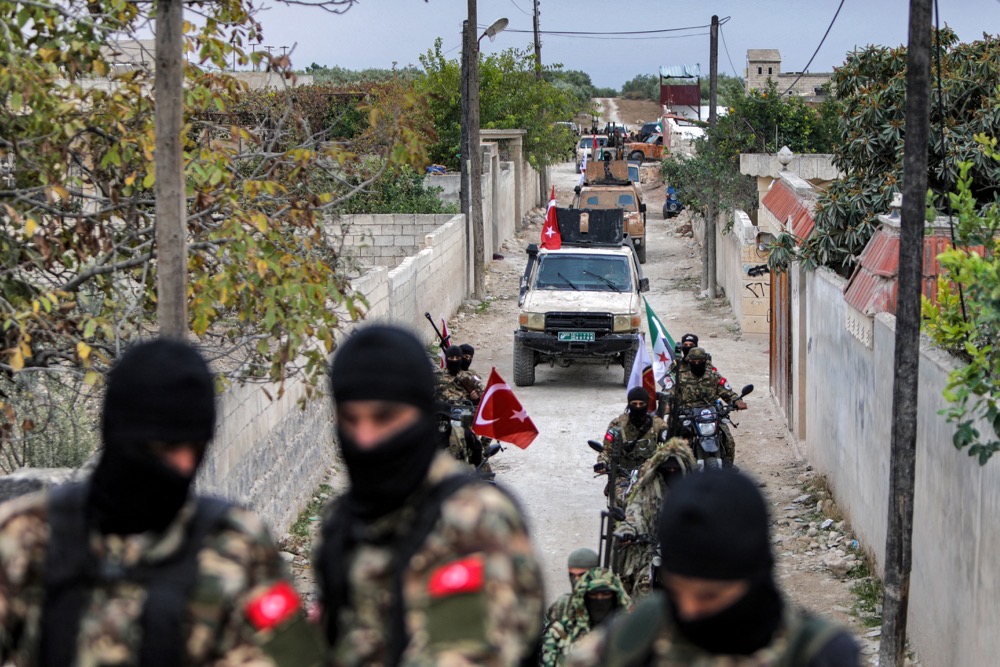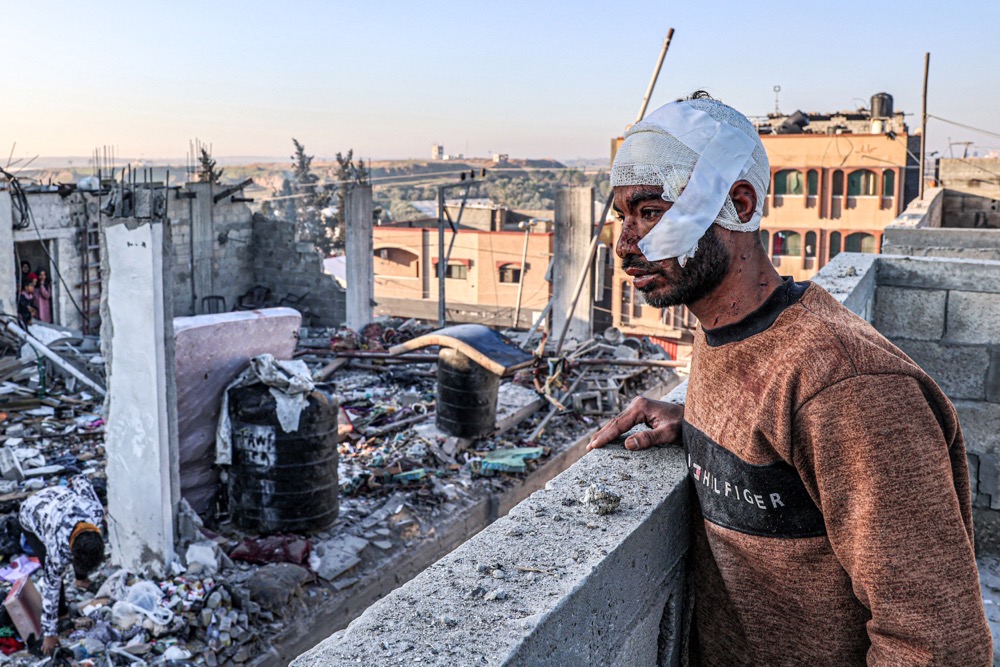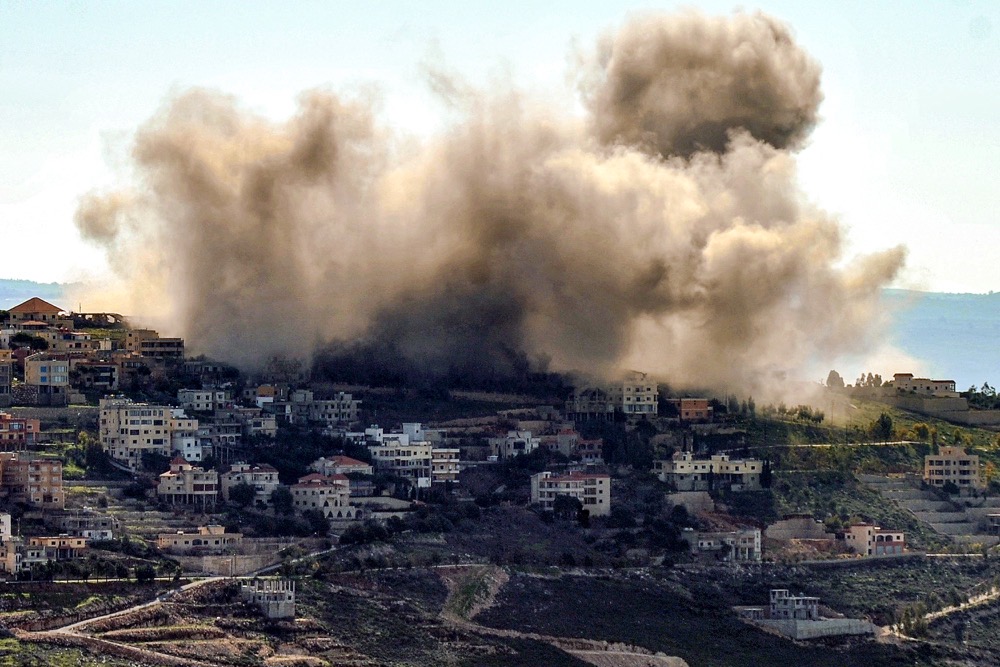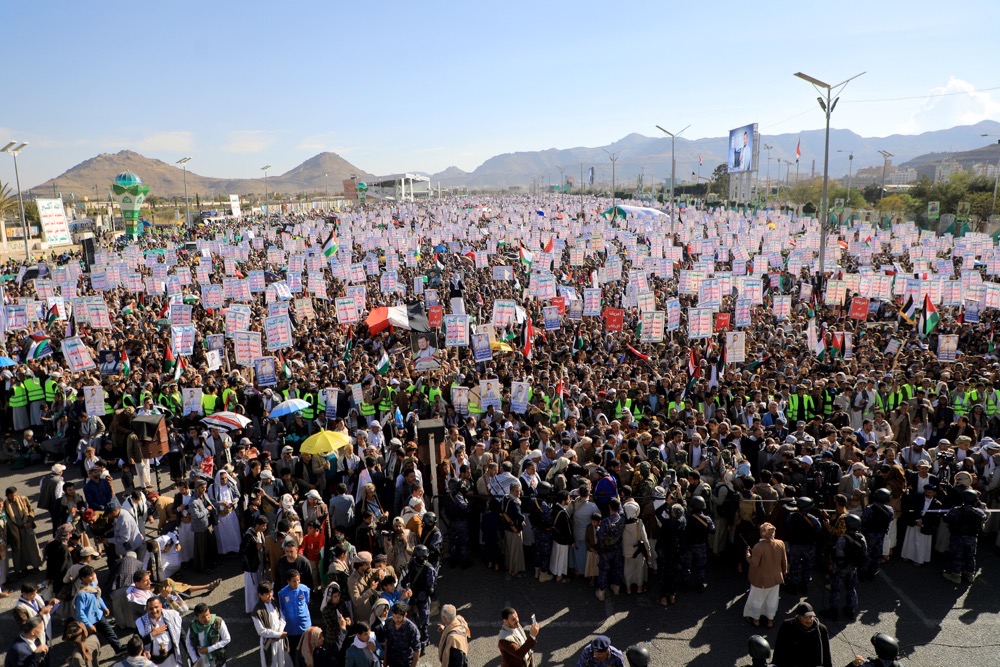LONDON: Israel’s military offensive in the Gaza Strip has spilled over into neighboring countries and sent shockwaves across the wider region, transforming Syria, Lebanon, Iraq and Yemen into battlefields in an escalating proxy war between the US and Iran.
This mounting instability has wrought havoc on the economies of the region, many of which were already grappling with deep recessions, spiraling inflation, high unemployment and political instability, leaving them ill-equipped to withstand a major conflict.
The International Monetary Fund revised down regional growth projections for 2024 by 0.5 percent in October following the Hamas-led attacks on Israel that saw 1,200 killed and 240 taken hostage, sparking the ongoing conflict in Gaza.
Regional gross domestic product is forecast to grow by a mere 2.9 percent this year — a scant improvement on the modest 2 percent growth seen in 2023.
With their economies stagnant, these nations could easily implode if the conflict escalates further.

Syrian fighters ride in a convoy during a military drill by the Turkish-backed “Suleiman Shah Division” in the opposition-held Afrin region of northern Syria. (AFP/File)
“Lebanon, Syria, Iraq and Yemen are all facing existing crises of one sort or another and can ill-afford to see economic investors flee due to the high risks of war,” Omar Rahman, a fellow at the Middle East Council on Global Affairs, told Arab News.
Since launching its military campaign in Gaza, Israel has simultaneously mounted a series of strikes against targets in Syria and Lebanon — many of them targeting senior members of Hamas and its fellow Iranian proxy Hezbollah.
The most recent of these attacks took place in January, when an Israeli strike on the Syrian capital Damascus hit a residential building reportedly used by members of Iran’s Islamic Revolutionary Guard Corps.
“Syria has become a battleground for great power rivalries, both regional and international,” Joshua Landis, director of both the Center for Middle East Studies and the Farzaneh Family Center for Iranian and Arabian Gulf Studies at the University of Oklahoma, told Arab News.
The increased drumbeat of Israeli strikes on Syrian military bases, weapons depots and airports, as well as the increasing number of targeted killings of leading Iranian officials, “means more death, destruction and instability,” he said.
Landis believes the escalating regional conflagration, with Israel and the US in one corner and Iran’s proxy militias in the other, has “provided cover for many local combatants to increase the pace of their attacks,” thereby compounding Syria’s multiple, overlapping predicaments.
“The Syrian regime has been bombing northwest Syrian militias in an effort to keep them from building effective state institutions in their region,” said Landis, referring to the armed opposition groups that remain in control of Idlib province and parts of Aleppo.
“Turkiye has intensified its assassination campaign against leading YPG (People’s Defense Units) officials in northeast Syria, and local Syrian communities have been up in arms against the oppression and mismanagement of local authorities.
“The Druze continue their demonstrations against the regime in the Jabal Druze, and the Arab tribes continue to militate against the Kurds in northeast Syria.”

An injured man looks at rubble and debris of a destroyed building in the aftermath of Israeli bombardment on Rafah, Gaza Strip. (AFP)
Against this backdrop, the regime of Bashar Assad in Damascus, long propped up by Iran and Hezbollah, has found itself, willingly or unwillingly, caught in the middle of this latest bout of regional turmoil.
Earlier this month, the US launched strikes against 85 targets across seven locations in Syria and Iraq in retaliation for Iran-backed militia attacks on US troops stationed in the region, including a Jan. 27 incident in which three American personnel were killed and 40 wounded at a base in Jordan close to the Syrian border.
And despite stating that “the United States does not seek conflict in the Middle East or anywhere else in the world,” President Joe Biden has vowed that its response “will continue at times and places of our choosing.”
For the Syrian public, this regional escalation spells further misery. “The economic fallout of this violence and instability has been severe,” said Landis. “The economy is frozen. Inflation continues to eat away at the spending power of Syrians, driving them into ever-greater poverty.”
According to UN figures, 90 percent of Syria’s population is grappling with poverty, with 80 percent living below the poverty line.
The UN Office for the Coordination of Humanitarian Affairs said in December that 16.7 million people across Syria require humanitarian assistance.
However, with multiple conflicts and crises raging across the globe, the humanitarian aid sector faces a funding crisis of its own.
The UN has requested $46 billion in donations for 2024, highlighting that the existing shortfall would leave more than 150 million people without aid.
“The UN Development Programme and World Food Programme are both hollowing out their humanitarian aid programs as the international gaze is diverted to Gaza, Sudan and other hotspots,” said Landis.
And what had initially looked like green shoots of recovery for the Syrian economy were soon buried.
Syria’s tourism sector, “which was a bright spot last year, can only be expected to take a downturn in the shadow of the Gaza war and regional instability,” said Landis.

Armed Yemeni Houthis sit on the back of an armored vehicle during an anti-Israel and anti-US rally in Sanaa. (AFP/File)
Lebanon faces similar challenges. Its border with Israel has been a flashpoint since the Gaza conflict began in October, with sporadic exchanges of fire between the Israel Defense Forces and Lebanese armed groups, including Hezbollah.
Many Lebanese fear that a full-blown conflict even more destructive than the 2006 war could easily break out, with unimaginable consequences for civilians.
Israeli Defense Minister Yoav Gallant warned in January that “the possibility of reaching a political settlement with Lebanon is running out, and as a result, we may end up resorting to military action.”
Having been in the throes of a crippling financial crisis since 2019 and trapped in a state of political paralysis, unable to appoint a new president or build a functioning administration, Lebanon is perhaps uniquely vulnerable.
“Lebanon, which is already reeling economically and politically, faces the clearest prospect of a catastrophic military conflict, like in 2006,” said Rahman.
“That’s why there’s a reluctance from Hezbollah for major escalation with Israel in spite of its other inclinations.”
Opinion
This section contains relevant reference points, placed in (Opinion field)
Citing the “high uncertainty” brought about by the Gaza war, the World Bank refrained from offering a forecast for Lebanon’s GDP in 2024.
The UN Department of Economic and Social Affairs, meanwhile, projected modest growth of 1.7 percent.
Eva J. Koulouriotis, a political analyst specializing in the Middle East, warned that any escalation on the Lebanese-Israeli border into all-out war “will have serious repercussions.”
This “dangerous” development “will increase the likelihood of its expansion to Syria and Iraq, as well as a greater escalation in Yemen under what Iran’s regional arms call the ‘unity of arenas’ strategy,” she told Arab News.
“Politically, in Lebanon, the state of division and disharmony between the political factions will increase and the specter of the Lebanese arena turning into a new civil war will return. This will mean a comprehensive collapse of the economy.”
Koulouriotis believes an escalation between Israel and Hezbollah, coupled with a failure to secure a ceasefire in Gaza, will only fuel the threat posed by the Iran-backed Houthi militia in Yemen to commercial shipping in the Red Sea and Gulf of Aden.

Smoke billows during Israeli bombardment on the village of Khiyam in southern Lebanon. (AFP)
Since Nov. 19, the Houthis have launched more than 20 missile and drone attacks against vessels in these strategic waterways, with the stated aim of pressuring Israel to halt its military campaign in Gaza.
In early February, the US and UK launched a barrage of strikes targeting 36 Houthi positions. Houthi military spokesman Yahya Saree said Yemen’s capital Sanaa was among the sites targeted.
Having been locked in its own grinding civil war between the Houthis and the internationally recognized government since 2015, Yemen is already in a state of economic ruin, with sections of its population on the brink of famine.
“War-torn Yemen is already highly dependent on humanitarian aid, and is in the midst of long-running negotiations to bring an end to its eight-year war,” said Rahman, warning that “the current confrontation with the US and UK risks destabilizing that process and disrupting crucial flows of aid and economic redevelopment.”
The US has also launched several attacks against Iran-backed militias operating in Iraq. On Feb. 8, an American drone strike in Baghdad killed a senior commander of Kataib Hezbollah alongside two of his guards.
The Pentagon claimed that the commander was responsible for the fatal Jan. 27 attack on US forces in Jordan.
INNUMBERS
• 2.9% IMF’s GDP growth forecast for the Middle East and North Africa in 2024.
• 90% Proportion of Syria’s population grappling with poverty, according to UN figures.
• 16.7m People across Syria who require humanitarian assistance, according to UN OCHA.
• 1.7% Lebanon’s projected growth in 2024, according to UN DESA.
US military bases in the Middle East have been hit with more than 165 rocket and drone attacks since mid-October.
Having emerged from decades of conflict and insurgency, Iraq had been showing signs of economic recovery, albeit still heavily reliant on oil exports and a bloated public sector.
Although regional instability is no doubt unwelcome at the very moment things appeared to be getting on track, Rahman believes the latest bout of regional violence offers “a mixed bag” for Iraq.
“In one sense, its oil export-dependent economy benefits from instability and higher prices,” he said. “Its Iran-aligned militias are also able to advance their agenda of pushing the US out of the country.
“On the other hand, Iraq already faces political and economic precarity and risks much in being a major flashpoint, or even frontline, in a regional war that includes Iran, as it tries to rebuild after decades of war.”
Landis, however, is optimistic about the prospects for Syria if the US is pushed out of Iraq. “If America is forced to abandon its bases in Iraq, pressure will mount to evacuate Syria as well,” he said.

Yemenis hold a pro-Palestine rally in Sanaa. (AFP/File)
“Should Damascus return to northeast Syria, possibilities for an economic revitalization will open up.
“It will bring pain to the Kurds, but most Syrians who live under government control will regain oil, gas and electricity. It will help Syria regain control of its lands and resources.”
America has some 2,500 troops stationed in Iraq, 900 in Syria, and around 3,000 in Jordan as part of a US-led coalition that seeks, according to the Pentagon, to prevent the resurgence of the terrorist group Daesh.
Although the region looks increasingly like a battlefield between the US and Iran, Koulouriotis doubts that the region will witness a direct confrontation between the two — something neither side professes to want.
“Despite the current ongoing escalation on various fronts in the region, the two main sides of the conflict in Washington and Tehran are still not interested in going towards a direct and comprehensive confrontation,” she said.























